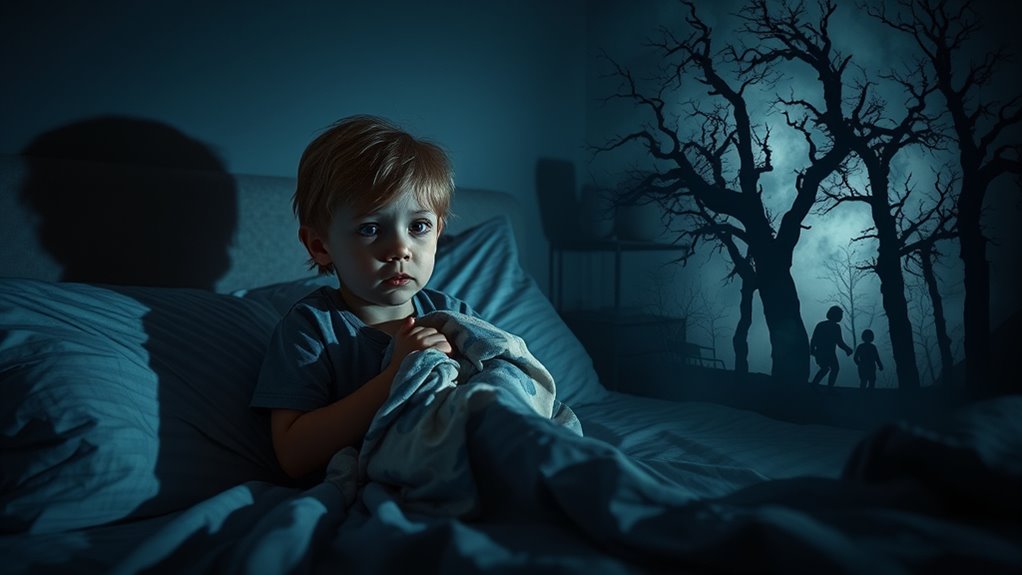Night terrors are intense episodes of fear during deep non-REM sleep, often causing you to scream, thrash, or sit up suddenly, with little to no memory afterward. In contrast, nightmares occur during REM sleep and leave you vividly recalling distressing images and feelings upon waking. While night terrors happen early in sleep and involve limited awareness, nightmares are remembered clearly and usually happen later. To understand more about these sleep experiences, explore what makes each one unique.
Key Takeaways
- Night terrors are episodes of intense fear during deep non-REM sleep, often with physical agitation, while nightmares are vivid distressing dreams during REM sleep.
- Night terrors involve little to no memory and diminished consciousness, whereas nightmares are remembered clearly with detailed images and emotions.
- Night terrors typically occur in the first few hours of sleep during deep sleep stages, while nightmares happen later during REM sleep.
- Symptoms of night terrors include screaming, thrashing, and unresponsiveness, unlike nightmares which involve recalling frightening dreams.
- Causes of night terrors include stress and sleep deprivation, mainly affecting children, whereas nightmares are linked to vivid dreaming and emotional factors.

Have you ever woken up suddenly feeling terrified, with no idea why? That intense rush of fear, accompanied by a racing heart and sweating, can be startling. These moments are often linked to sleep disturbances like sleep paralysis, a phenomenon that occurs during REM sleep. During REM sleep, your brain is highly active, and your muscles are temporarily paralyzed to prevent you from acting out your dreams. Sometimes, this paralysis persists upon waking, leading to sleep paralysis episodes where you might feel immobilized and trapped between dreams and reality. It’s during these episodes that you might also experience hallucinations or a sense of a malevolent presence, which can be terrifying enough to mistake for night terrors. Understanding sleep stages can help clarify why these episodes happen. Night terrors and nightmares are both frightening, but they differ substantially in how they manifest and who experiences them. Night terrors typically happen during deep non-REM sleep, usually within the first few hours after falling asleep. You might sit up suddenly, scream, thrash, or appear inconsolable, often without fully waking up. Unlike nightmares, which happen during REM sleep and often involve vivid, distressing images that you remember upon waking, night terrors leave little to no memory of the episode. You’re usually left feeling shaken but unaware of what caused the terror. This disconnect is key: during a night terror, your brain is in a state of partial arousal from deep sleep, but you’re not fully awake or conscious of what’s happening. The main difference lies in the sleep stages involved and your awareness afterward. Nightmares occur during REM sleep, when dreaming is most intense, and tend to be remembered clearly, often with detailed images and emotions. Night terrors happen during non-REM sleep, in a state where consciousness is diminished, which is why your recall is minimal or nonexistent. Night terrors are more common in children, but adults can experience them too, often linked to stress, sleep deprivation, or certain medications. Understanding these distinctions can help you recognize what you’re experiencing. If you’ve ever felt immobilized during sleep or suddenly jolted awake in a panic, it might be sleep paralysis or a night terror. Both are frightening, but knowing the differences can guide you toward better sleep habits and seeking help if needed.
Frequently Asked Questions
Can Night Terrors Occur in Adults or Only Children?
Night terrors can indeed occur in adults, not just children. In adult sleep, they often stem from stress, trauma, or unresolved childhood fears. You might experience sudden, intense episodes with screaming or thrashing, even if you’re fully grown. Unlike childhood fears, which usually fade with age, adult night terrors can be more disruptive and require medical attention. Recognizing these signs helps you seek appropriate treatment to improve your sleep quality.
Are Night Terrors Caused by Psychological Factors or Physical Issues?
Night terrors can be caused by both psychological influences and physical health issues. Stress, anxiety, or trauma often trigger them, showing psychological roots. Physical health problems like sleep disorders or medication side effects may also contribute. You might notice that addressing these factors helps reduce night terrors. It’s important to consult a healthcare professional if they persist, as they can identify underlying causes and recommend appropriate treatment options.
How Can Parents Effectively Respond to a Child’s Night Terrors?
Imagine holding a flickering lantern in a storm—you can’t stop the chaos, but you can guide your child safely. When responding to night terrors, offer gentle parental reassurance without waking them, keeping calm and soothing. Strengthen bedtime routines, creating a sense of security that acts as your shield. Your calm presence helps your child navigate the storm, gradually reducing the frequency and intensity of their night terrors.
Do Sleep Medications Help Reduce the Frequency of Night Terrors?
Sleep medications may help reduce night terrors for some, but their efficacy varies. You should consult a healthcare professional to evaluate if medication is appropriate for you or your child. Improving sleep hygiene—like maintaining a consistent sleep schedule and creating a calming bedtime routine—often helps lessen frequency. Medications are usually a last resort, and addressing underlying stress or sleep issues can be more effective in managing night terrors long-term.
Are There Long-Term Health Effects Linked to Frequent Night Terrors?
Frequent night terrors can lead to long-term health effects like sleep deprivation, which makes you feel exhausted and hampers your immune system. Stress management becomes essential, as ongoing stress can worsen these episodes. If you don’t address night terrors, they might increase your risk of mental health issues and cardiovascular problems. Prioritize good sleep habits, reduce stress, and seek professional help to protect your overall health.
Conclusion
So, now that you know night terrors and nightmares are basically the sleep world’s version of a bad sitcom, you’re better equipped to handle your midnight freak-outs. Whether you’re waking up drenched in sweat or just mumbling about monsters, remember—it’s all part of the wild ride called sleep. Just don’t start expecting awards for the best scream or the most dramatic wake-up. Sleep’s got enough drama without your starring role, so relax and try to enjoy the show!









